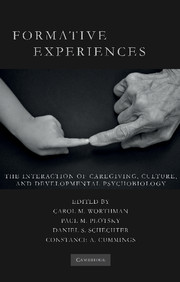Book contents
- Frontmatter
- Contents
- List of Figures
- List of Tables
- List of Contributors
- Foreword by Robert Sapolsky
- Preface
- List of Abbreviations
- Introduction
- SECTION ONE HISTORICAL, CROSS-CULTURAL, AND DEVELOPMENTAL SCIENCE PERSPECTIVES
- SECTION TWO HOW EXPERIENCE INTERACTS WITH BIOLOGICAL DEVELOPMENT
- SECTION THREE FORMATIVE RELATIONSHIPS WITHIN AND ACROSS GENERATIONS
- SECTION FOUR SOCIAL AND CULTURAL CONTEXTS OF CHILDHOOD DEVELOPMENT – NORMATIVE SETTINGS, PRACTICES, AND CONSEQUENCES
- SECTION FIVE FEAR, FUN, AND THE BOUNDARIES OF SOCIAL EXPERIENCE
- SECTION SIX PUBLIC HEALTH, EDUCATION, AND POLICY IMPLICATIONS
- Index
Foreword by Robert Sapolsky
Published online by Cambridge University Press: 26 May 2010
- Frontmatter
- Contents
- List of Figures
- List of Tables
- List of Contributors
- Foreword by Robert Sapolsky
- Preface
- List of Abbreviations
- Introduction
- SECTION ONE HISTORICAL, CROSS-CULTURAL, AND DEVELOPMENTAL SCIENCE PERSPECTIVES
- SECTION TWO HOW EXPERIENCE INTERACTS WITH BIOLOGICAL DEVELOPMENT
- SECTION THREE FORMATIVE RELATIONSHIPS WITHIN AND ACROSS GENERATIONS
- SECTION FOUR SOCIAL AND CULTURAL CONTEXTS OF CHILDHOOD DEVELOPMENT – NORMATIVE SETTINGS, PRACTICES, AND CONSEQUENCES
- SECTION FIVE FEAR, FUN, AND THE BOUNDARIES OF SOCIAL EXPERIENCE
- SECTION SIX PUBLIC HEALTH, EDUCATION, AND POLICY IMPLICATIONS
- Index
Summary
The field of psychobiology recently lost one of its giants, Seymour “Gig” Levine, who spent a remarkably productive career showing the ways in which early experience shapes the brain and behavior. Although passionately interested in the topic of development, he was realistic enough to admit that it wasn't a subject for everyone – “At some point or other, everyone in our business gets around to doing a development study. After that, either they're hooked forever, or they run away as fast as possible because development's so damn complicated,” he once said to me (which I think was meant to taunt me for being in the second category).
Stated in the most low-key manner, the purpose of a volume such as this is not only for the developmental psychobiology obsessives to catch up on the latest work, but also to make such an update readily accessible to the ones who ran away from the subject as fast as possible. Stated more hopefully, this volume can be meant to entice those who did the one-night-stand with the subject into a longer commitment. And stated hegemoniously, it can be meant to convince those who fled that they must start studying development.
But when the current state of developmental psychobiology is considered closely, a conclusion must emerge that speaks to all the other psychobiologists – tough luck, you've got no choice in the matter, you're already studying the development of brain and behavior.
- Type
- Chapter
- Information
- Formative ExperiencesThe Interaction of Caregiving, Culture, and Developmental Psychobiology, pp. xxiii - xxviPublisher: Cambridge University PressPrint publication year: 2010
- 1
- Cited by



